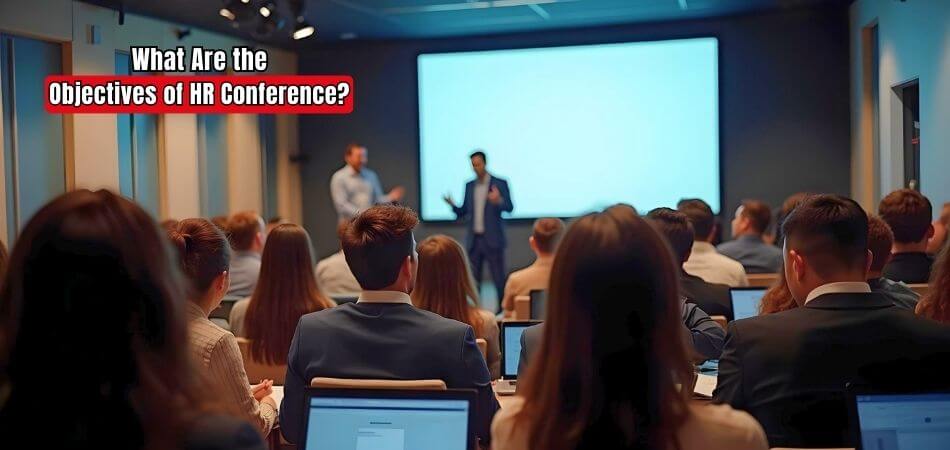In the fast-paced business world, human resource conferences have become increasingly popular. As organizations recognize the value of effective HR practices, these events serve as essential hubs for professionals to gather, share insights, and explore new trends. Many individuals may wonder: What are the objectives of HR conference?
The primary objectives of HR conferences focus on facilitating professional growth, encouraging innovation, and promoting collaboration among attendees. These events provide opportunities for participants to enhance their skills, learn about emerging HR practices, and engage with experts in the field. By achieving these objectives, conferences help HR professionals stay informed and effective in their roles.
If you’re curious about the specific goals and objectives of HR conferences, read on. This article delves into the key objectives that shape these events, providing you with valuable insights and information essential for understanding their significance in the HR fields.
The Origins and Growth of HR Conferences
Early in the 20th century, as human resource management began to gain popularity, HR conferences were born. Initially, these events were small and focused primarily on administrative tasks. Over the decades, they grew in size and significance, adapting to the evolving needs of businesses.
As the field of work changed, so did the topics discussed at these conferences. They began to include a broader range of issues, including workplace culture, leadership, and organizational development. Attendees sought knowledge to address these challenges effectively and create better workplaces for their employees.
Today, HR conferences attract a diverse audience and cover numerous relevant topics. Many professionals attend these events to stay updated with industry trends and best practices. Events like the HR conference in Canada, for example, offer amazing insights into local HR practices while fostering connections among attendees from different backgrounds.
What Are the Objectives of HR Conference?
HR conferences serve as essential gatherings for HR professionals to explore key industry topics and advancements. These events focus on various objectives that shape modern HR practices. Here’s information on the primary goals driving HR conferences today.

Building Professional Growth
Professional growth remains a core focus of HR conferences, providing attendees with tools and knowledge to thrive. Workshops, expert sessions, and real-life case studies offer valuable opportunities for participants to learn and grow. HR professionals can expand their capabilities, ensuring they stay competitive in an ever-changing workplace environment.
Encouraging Industry Innovation
To stay ahead of the competition, HR practices must be innovative, and conferences inspire attendees to try out novel strategies. Experts share insights on the latest developments and innovative strategies that make a real difference. This emphasis on creativity and transformation leads to the growth of effective, forward-thinking HR solutions.
Strengthening Collaboration
For industry advancement and problem-solving, HR professionals must work closely together. HR conferences bring participants together, encouraging partnerships and team-based solutions. These events create a supportive community, allowing attendees to share ideas and experiences while tackling common challenges through cooperative efforts.
Promoting Digital Development
Adoption of technology is a significant objective of HR conferences as it drives efficiency and productivity in the field.
Participants get to learn about emerging HR technologies such as digital onboarding tools, AI, and data analytics.
This focus on digital transformation empowers professionals to implement technology-based solutions in their workplaces, benefiting their organizations.
Increase Employee Engagement
Successful organizations place a high value on employee engagement, which HR conferences seek to enhance through creative methods. Professionals gain insights into strategies that help create positive work environments and increase employee motivation. By increasing engagement, HR professionals contribute to organizational success and long-term employee satisfaction.
Encouraging Diversity and Inclusion
The emphasis on diversity and inclusion has grown considerably, making it a primary goal of HR conferences. Attendees participate in sessions on building inclusive workplaces, promoting equity, and addressing biases. This learning ensures HR professionals are equipped to create supportive environments that value every individual and embrace different perspectives.
Improving Organizational Practices
One important goal of HR conferences is to improve overall HR practices within organizations. Participants learn about effective strategies, tools, and techniques that make human resources management more efficient. Insights from experienced speakers allow attendees to refine their practices, ensuring better outcomes for both employees and employers.
The main objectives of HR conferences are to inspire growth, collaboration, and innovation among professionals. Achieving these objectives eventually leads to the fulfillment of the broader purpose of HR conference, which enhances the efficiency and effectiveness of HR practices within organizations.
Who Attends HR Conference?
A wide range of professionals dedicated to expanding their human resources expertise come together at HR conferences. These events provide networking opportunities and insights into current trends and challenges. Various individuals attend, bringing unique perspectives and experiences to the discussions that unfold.
HR Professionals
The majority of attendees at HR conferences are human resource professionals. They come from various industries and sectors, seeking to improve their skills and knowledge. These individuals often manage recruitment, employee relations, and performance management, making their presence vital for insightful discussions and learning.
Business Leaders
Executives and managers are among the business leaders who attend these conferences. Their focus often revolves around understanding how HR strategies align with overall business goals. Engaging with HR professionals helps them learn about best practices that enhance workforce productivity and foster a positive company culture.
Consultants and Experts
At HR conferences, consultants and industry experts are crucial. They share their expertise and offer insights into emerging trends and tools. Their presentations often cover specialized topics that benefit HR professionals looking to implement new strategies in their organizations.
Educators and Researchers
Taking part in HR conferences is a common way for researchers and educators to share their findings and gain insight from industry practices. They present their research on various HR topics, supporting discussions that bridge the gap between theory and practice. Their participation enriches the overall experience for attendees seeking to deepen their understanding.
Students and Emerging Professionals
At these conferences, students and aspiring HR professionals are also important participants. They seek to learn from seasoned professionals and gain insights into the industry. Networking with experienced individuals allows them to build connections and explore potential career opportunities in human resources.
Everyone who attends an HR conference gains access to a multitude of information and networking opportunities. Each group brings its individual perspective, making these events enriching and dynamic experiences for everyone involved.
How Do You Find the Right HR Conference for Your Needs?
Choosing the appropriate HR conference can have a big impact on your career advancement. Numerous events cater to different interests, topics, and goals. Choose the conference that aligns with your career aspirations and learning goals by understanding your needs.
Identify Your Goals
Before searching for a conference, identify your specific goals. Consider what you hope to achieve by attending. Are you looking to enhance your skills, network with peers, or learn about new trends? Knowing your objectives will help narrow down your options.
Research Available Conferences
When making a decision, investigate the conferences that are offered. Explore different events and their themes, speakers, and schedules. Read reviews and testimonials from previous attendees to gauge the quality of the experience. This step is crucial for finding conferences that suit your interests and needs.
Consider the Location
The location of the conference can also play a significant role in your decision. Some professionals prefer attending events close to their home or office. While others may be interested in broader opportunities, such as Canadian events, where diverse perspectives and practices are shared, this is where applying to attend HR conferences in Canada becomes first priority for them.
Analyze the Speakers and Content
The speakers and content presented at the conference are vital for a rewarding experience. Look for events featuring industry leaders and experts who will discuss relevant topics. A well-curated agenda ensures that attendees gain valuable insights and practical knowledge applicable to their roles.
Networking Opportunities
During conferences, networking opportunities can improve your overall experience. You can make connections with other professionals by going to an event that offers plenty of networking opportunities. Engaging with others can lead to valuable collaborations and lasting relationships that benefit your career development.
Selecting the right HR conference involves careful consideration of your goals and available options. By evaluating these factors, you can ensure a productive and enriching experience that aligns with your professional journey.
Tips for Networking Effectively at an HR Conference
Participating in an HR conference can help you network and make useful connections. Engaging with other professionals allows you to exchange ideas and gain insights from their experiences. With the right approach, you can maximize your networking potential at any event.
- Prepare Your Introduction: Describe your background and current position succinctly. A well-prepared introduction makes it easier to start conversations. Make sure it is engaging and reflects your personality while clearly stating your professional focus and interests.
- Utilize Social Media: Use social media platforms to connect with attendees before the event. Follow the conference hashtag to engage with others and share your insights. This pre-conference engagement can help establish connections that you can continue at the event itself.
- Set Clear Goals: Before the conference, define specific networking goals to focus your efforts on. Decide how many people you want to connect with or what kind of professionals you wish to meet. Having clear goals will help guide your conversations and interactions.
- Attend Networking Events: Participate in scheduled networking events during the conference. These gatherings provide relaxed environments where you can meet other attendees. Be open to initiating conversations and sharing your thoughts on various topics related to human resources.
- Ask Open-Ended Questions: Engage others by asking open-ended questions that encourage discussion. This approach shows genuine interest in their experiences and insights. Asking thought-provoking questions can lead to deeper conversations and valuable exchanges of ideas and knowledge.
- Follow Up After the Conference: After the event, take time to follow up with the people you met. Send personalized messages or connection requests to keep the relationship alive. Following up shows that you value the connection and wish to continue the dialogue.
- Be Genuine and Approachable: Approach networking with a genuine and friendly demeanor. Smile and be open to meeting new people, as this makes you more approachable. Authenticity fosters trust and encourages meaningful connections that can lead to future collaborations.
Building connections at an HR conference is essential for professional growth. By using these tips, you can create lasting relationships that contribute to your career and enhance your understanding of the HR field. Engaging with others will enrich your experience significantly.
Frequently Asked Questions
Human resource management practices and development are significantly shaped by HR conferences. Below, we address some frequently asked questions about the objectives and importance of HR conferences. These FAQs provide a deeper understanding of how these events benefit HR professionals and organizations.
How Do HR Conferences Improve Leadership Skills?
Particular sessions devoted to enhancing leadership abilities in the human resources domain are available at HR conferences. By attending workshops and seminars led by experienced leaders, participants learn about effective leadership techniques. The goal is to inspire confidence and capability among HR professionals so they can guide their teams more successfully.
Why Are HR Conferences Essential for Team Building?
Team building is a critical focus at HR conferences, with activities and workshops designed to promote collaboration. These events provide professionals with tools and techniques to foster teamwork within their organizations. Learning about successful team-building methods helps create more cohesive, efficient, and motivated HR teams.
What Role Do HR Conferences Play in Shaping Company Culture?
HR conferences often include sessions focused on cultivating positive company culture. By attending these sessions, HR professionals learn strategies for enhancing workplace values and improving the environment. A better knowledge of how HR policies impact culture helps participants create a more productive and inclusive workplace.
How Do HR Conferences Support Conflict Resolution?
Supporting effective conflict resolution is an important objective of HR conferences. Attendees gain insights on managing disputes within teams through practical examples and guidance from experienced professionals. Learning about conflict resolution techniques empowers HR managers to handle workplace issues effectively, leading to a more harmonious work environment.
How Can HR Conferences Help Develop Employee Wellness Programs?
The significance of employee wellness is emphasized at HR conferences, which cover initiatives that improve both mental and physical health. Professionals learn to design and implement wellness initiatives that enhance employee satisfaction and performance. Developing wellness programs becomes easier after learning about successful practices, ultimately contributing to healthier and happier workforces.
Closing Remarks
In the HR industry, HR conferences are now essential for fostering innovation, growth, and teamwork. Participating in these events offers HR professionals opportunities to enhance their skills, connect with others, and learn about evolving industry practices that help create better workplaces.
When considering, what are the objectives of HR conference? the answer lies in their focus on professional growth, innovation, collaboration, and improving HR effectiveness. These objectives empower professionals to stay ahead in a changing landscape and improve their organization’s culture, productivity, and employee engagement.
To make the most of an HR conference, come prepared with clear goals, stay open to learning, and engage actively. Don’t miss out on these opportunities, and you’ll gain valuable knowledge and connections. Best wishes for your future growth and success!







